At its third consecutive policy meeting, the Reserve bank of India has kept its repo rate also known as lending rate stable at 6.25 percent. The decision of RBI is taken in the purview of upcoming goods and service tax which can even cause inflation as speculated. The reserve bank of India did an unexpected cut in rates in the October’s meeting of RBI monetary policy and has kept them stable. Almost all the 60 noted economists have predicted the decision of keeping the repo rate stable came out to be true after the Reuters poll conducted over the decision taken by the six-member monetary policy committee.
Read Also: GST Online Payment Guide for Petty Tax Payers India
In a complex terminology, the reserve bank of India mentioned that the risks are neutrally balanced through the inflation trajectory at the present scenario where there is a up-going risk to the baseline projection. For this, the RBI also gave an answer in the statement that, “uncertainty surrounding the outcome of the south-west monsoon in view of the rising probability of an El Nino event around July-August, and its implications for food inflation.”
The statement also added which was released by the supreme bank institution that says, “a prominent risk could emanate from managing the implementation of the allowances recommended by the 7th central pay commission. In case the increase in house rent allowance as recommended by the 7th CPC is awarded, it will push up the baseline trajectory by an estimated 100-150 basis points over a period of 12-18 months, Another upside risk arises from the one-off effects of the GST.”
Recommended: GST Impact on Banking Sector in India
On a positive note, the reserve bank of India also improvised the reverse repo rate, by 25 basis points to a healthy 6.00 percent which has now bridged the gap between the two major rates by 25 bps. As a result, the National Stock Exchange (NSE) banking sub-index has discarded the previous losses as in the meantime the banking shares saw a gradual uplift after the announcement being made by the RBI. As an addition to the knowledge, the Reserve bank of India has speculated consumer inflation to an average 4.5 percent in the first half of the year 2017 while for the second half of the year 2017, it has been speculated a 5 percent consumer inflation.
